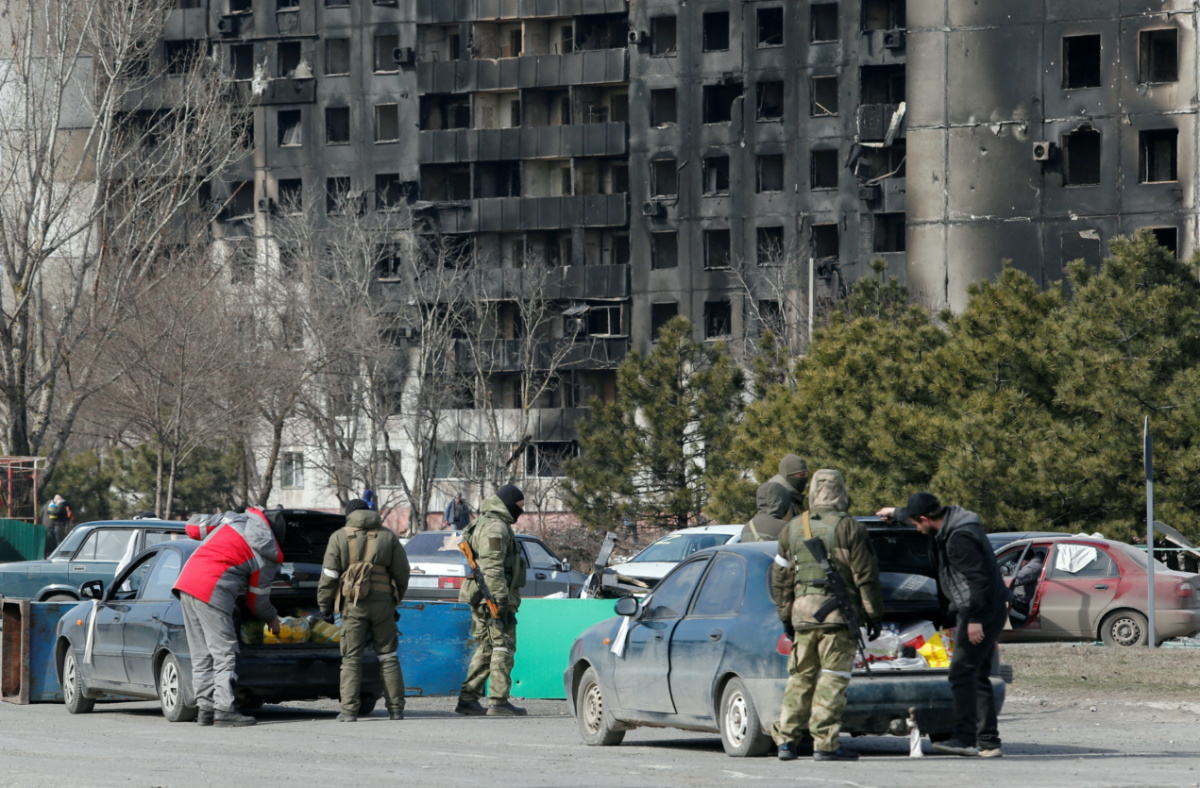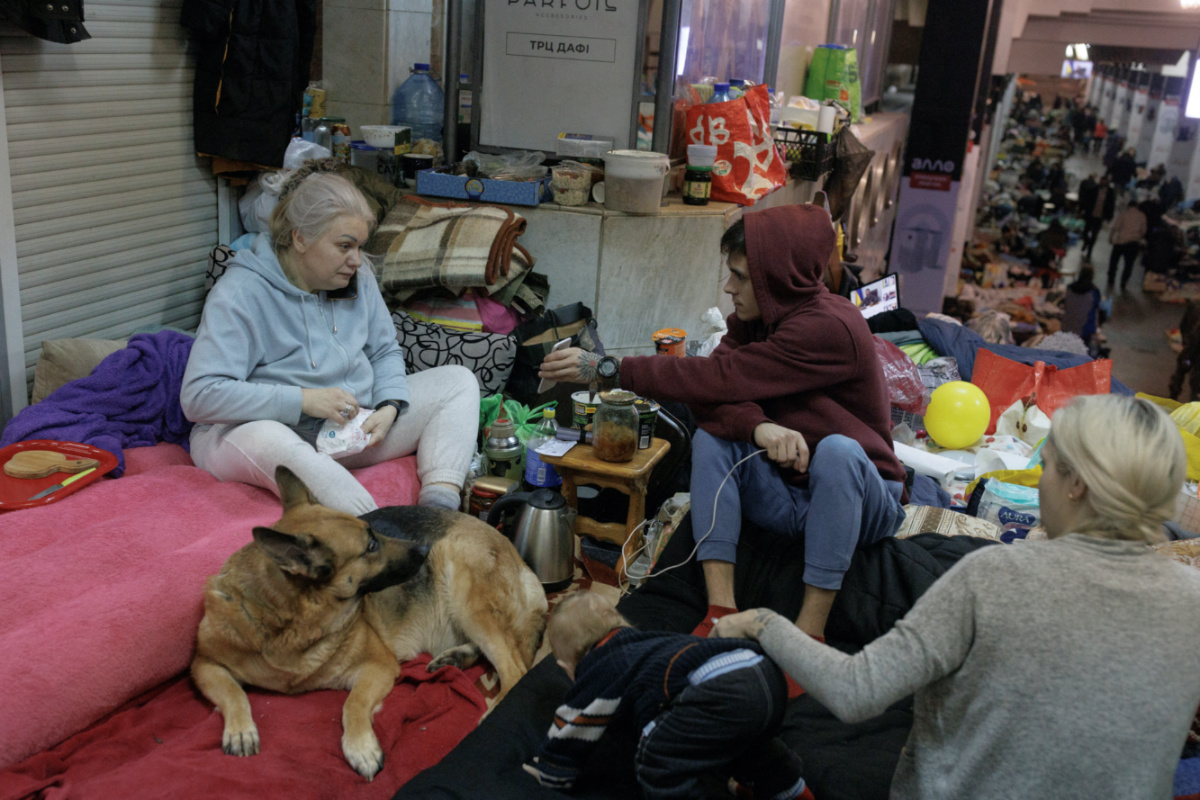It took two days of searching under heavy shelling before twin sisters Hanna and Anastasiya Hrechkina from Mariupol managed to find a ride out of the city.
“I lost any hope because people were not stopping,” said Anastasiya, a 22-year-old psychology student.

Service members of pro-Russian troops check cars during Ukraine-Russia conflict in the besieged southern port city of Mariupol, Ukraine, on 20th March. PICTURE: Reuters/Alexander Ermochenko/File photo.
Together with their mother and aunt, a cousin and a friend, the sisters said they decided to leave Mariupol after more than two weeks of a siege by Russian forces which has laid their city in eastern Ukraine to waste.
FEARING BOMBS AND WAR, KHARKIV FAMILIES SPEND A MONTH UNDERGROUND
In a Ukrainian city battered by bombs since the start of Russia’s invasion, Natalia Shaposhnik and her daughter Veronika live in a blue and yellow train parked in a metro station deep underground.
For four long weeks, Shaposhnik and hundreds like her have hunkered down inside the station in the north of Kharkiv, Ukraine’s second largest city.

Lyudmila Lazareva and her dog Rika sit in a in a metro station in northern Kharkiv with Katarina Bovt, Kolya and their son Nikita where they live to shelter from shelling in their neighbourhood, as Russia’s attack on Ukraine continues, Ukraine, March 24, 2022. Lazareva has moved to the underground shelter 30 days ago after the apartment building next to hers got hit by a shell on the first day of the wa and she only leaves the station to briefly walk her dog. REUTERS/Thomas Peter
With destroyed or heavily damaged buildings on almost every block, the streets were eerily quiet and empty above ground on Thursday.
Down in the station, families crowded together, most of them from the city’s northern outskirts which have suffered near-daily shelling.
Women and children slept side by side on cold concrete floors, or set up home in warmer train carriages divided by curtains into smaller family rooms.
They go out only to walk their dogs or to get a fresh breath of air, a small respite from the dank humidity underground.
“It’s not better than home but it is liveable,” said Shaposhnik, 36, who used to work in a pet shop before the war.
Even underground, the war is ever-present.
On Thursday, a Russian missile hit a metro station two stops away from where Shaposhnik lives with her daughter, killing and wounding several people.
Outside, while a crew cleaned up the shrapnel from the site, a car crammed with wounded Ukrainian soldiers screeched past.
A month on from the start of the invasion, Ukrainian President Volodymyr Zelenskiy has cast the war as an existential battle not only for his country but for all of Europe.
Russia refers to the invasion as a “special military operation” and says its forces do not target civilians.
Shaposhnik said she still knew Russians who did not believe that civilians have been shelled, despite the carnage of the past four weeks.
“I wrote to them [that] I’ve been sheltering with my child in the metro for a month and they don’t believe me. They say ‘it is your own fault, you are to blame, it is you, you, you,” she said.
– THOMAS PETER and VITALII HNIDYI/Reuters
On the first day they tried to escape, the shelling was so intense that every 5 to 10 minutes they had to abandon their belongings by the roadside and run for cover, Anastasiya said. Eventually, they abandoned the attempt and returned home.
Then on the second day, a man fleeing the city with his family in four vehicles agreed to take the group.
Although there were only seats for four additional passengers, all six people squeezed into the vehicles in what Hanna said was the “happiest moment of the day.”
Mariupol, once a city of 400,000 people, has been almost completely flattened by prolonged Russian bombardment aimed at breaking the resistance of the city’s Ukrainian defenders.
Hundreds of thousands of people have been hiding in basements with no running water, food, medicine or power, unable or unwilling to leave. Ukraine’s President Volodymyr Zelenskiy has said there was “nothing left” of the city.
Russia’s Defence Ministry has blamed “Ukrainian nationalists” for what it called the “humanitarian catastrophe” in Mariupol.
Russia calls its actions in Ukraine a “special operation” to destroy its southern neighbour’s military capabilities and capture what it regards as dangerous nationalists. It denies targeting civilians.
The Hrechkina sisters and their family held out for the first weeks of the siege, even as conditions deteriorated and the fighting moved closer.
“We didn’t want to leave. We were hoping it would stop,” said Hanna, also a student.
Cut off
Anastasiya said they rationed food, eating only two times a day. With no gas supply, the sisters said residents built fires outside to heat their food, some destroying benches or cutting trees.
With cell phone networks disrupted and no electricity to charge their devices, the sisters were cut off from the world.
“We thought that maybe if no one comes to save us, maybe the world just doesn’t know about the situation,” Anastasiya said.
When the shelling became so intense that they could no longer get water from a nearby well, they knew they had to leave, the sister said.
As the four vehicles returned to the road, the sisters did not ask where they were headed.
“I don’t know where we’re going, I don’t know how much time it will take but I was happy that I am in the car, we are all with our family,” Hanna said.
But the sisters then discovered that not all the cars were going to the same destination, realising with horror that they had been separated from their mother.
Their car took them to Berdiansk, from where they managed to get a bus laid on by the Ukrainian Red Cross which was to take them to Zaporizhzhia, where they hoped to reunite with their mother.
However, heavy shelling forced the bus to stop about 50 kilometres from the city.
“I had a panic attack there, I thought that after we escaped Mariupol, I didn’t want to die on the road,” Anastasiya said.
Finally reunited with their mother, relatives took the sisters from Zaporizhzhia to Kryvyi Rih, 400 kilometres north-west of Mariupol.
“I want to be in Ukraine and I want to come back to Ukraine, but right now I feel [the] need to be in a more safe place than we have now in Ukraine,” Hanna said.
“There is always a threat to be surrounded again. I don’t want to go through that,” Anastasiya said.






